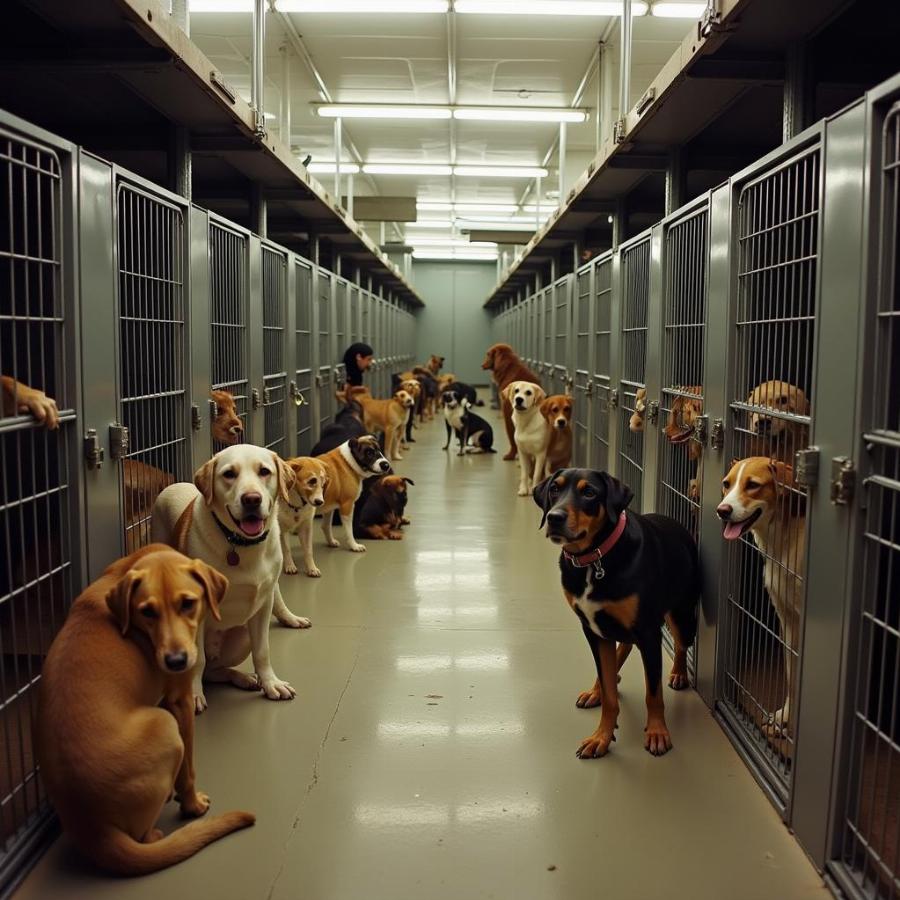The phrase “dog in jail” might conjure up images of a furry friend behind bars, but the reality is often less dramatic and more nuanced. While there are rare instances of dogs being symbolically “jailed” for misbehavior, the term usually refers to temporary holding facilities for stray or abandoned animals, often called animal shelters or pounds. Understanding the different situations where a dog might be held in a facility, and knowing the alternatives, is crucial for every responsible pet owner.
What Does “Dog in Jail” Really Mean?
“Dog in jail” is rarely literal. It’s a colloquialism that can describe several different scenarios. It might refer to a dog being held in a shelter after being picked up as a stray. Sometimes, it might refer to dogs seized due to owner neglect or abuse. Less commonly, “dog in jail” can be a whimsical term for a dog being confined to a crate or other small space as a form of discipline. Understanding the context behind this phrase is crucial.
Exploring the Reality of Animal Shelters
Animal shelters, often referred to as “dog pounds,” are temporary holding facilities for stray, lost, or abandoned animals. These shelters provide basic care, including food, water, and shelter, until the animals can be reunited with their owners or adopted into new homes. While conditions vary, shelters aim to provide a safe and humane environment. Overcrowding and limited resources are common challenges faced by these facilities.
 Overcrowded Animal Shelter with Dogs in Kennels
Overcrowded Animal Shelter with Dogs in Kennels
Alternatives to “Dog Jail”: Preventing Shelter Stays
Preventing a dog from ending up in a shelter is always the best option. Microchipping your dog is a crucial first step. A microchip allows shelters and veterinarians to quickly identify lost pets and contact their owners. Ensuring your dog wears a collar with identification tags is another essential precaution. Secure fencing and responsible leash practices can prevent your dog from straying in the first place.
Legal Implications of Canine “Incarceration”
In cases of severe neglect or abuse, dogs may be seized by animal control or law enforcement. These dogs are typically held in shelters while legal proceedings take place. The outcome can range from the owner being required to improve their care practices to the dog being permanently removed from the owner’s custody and made available for adoption. In some regions, there are specific laws pertaining to dangerous dogs, and these can involve holding the dog in a specialized facility.
The Role of Responsible Pet Ownership
Responsible pet ownership plays a vital role in preventing dogs from ending up in shelters. This includes providing proper nutrition, exercise, socialization, and veterinary care. Training your dog is also essential for their well-being and can prevent behavioral issues that might lead to them running away or being surrendered. [dog barks in crate] might be a sign of anxiety or boredom, and addressing the underlying cause is crucial for responsible pet ownership. Likewise, understanding the potential legal ramifications of animal neglect, as in a [woman sentenced to 15 years dog] related case, highlights the seriousness of responsible pet ownership.
Conclusion
The term “dog in jail” encompasses a variety of situations, from temporary shelter stays to legal holds due to neglect or abuse. Understanding these different scenarios and focusing on responsible pet ownership can help keep dogs out of shelters and in loving homes. Microchipping, proper identification, secure fencing, and training are key elements of responsible pet ownership. Remember, preventing a dog from ending up in a shelter is always the best outcome.
FAQ
- What should I do if I find a stray dog? Contact your local animal shelter or animal control immediately.
- How can I adopt a dog from a shelter? Visit your local shelter and inquire about their adoption process.
- Is it expensive to adopt a dog? Adoption fees are generally lower than purchasing a dog from a breeder and often include initial vaccinations and spaying/neutering.
- What are the legal requirements for owning a dog in my area? Check with your local government for specific regulations regarding dog ownership.
- How can I help my local animal shelter? Shelters often rely on donations and volunteers. Contact your local shelter to find out how you can contribute.
- What if I can no longer care for my dog? Contact local rescue organizations or shelters to explore rehoming options. [cole prevost dog jail] and [slammer dogs manga] might offer fictional narratives related to dog impoundment but real-life resources are readily available.
- Are there alternatives to traditional shelters? Some communities have foster-based rescue organizations.
Further Reading and Resources
- Dog Training Tips
- Understanding Dog Behavior
- Choosing the Right Dog Breed for You
Beaut Dogs is your trusted source for comprehensive information on the world of canine companions, from breed specifics to responsible care and everything in between. For personalized support and answers to your specific questions, contact us via Email at [email protected]. We’re here to help you navigate the joys and responsibilities of dog ownership. Visit us at https://beautdogs.com to learn more. A [dog police costume] might be fun, but understanding real-world responsibilities is paramount.